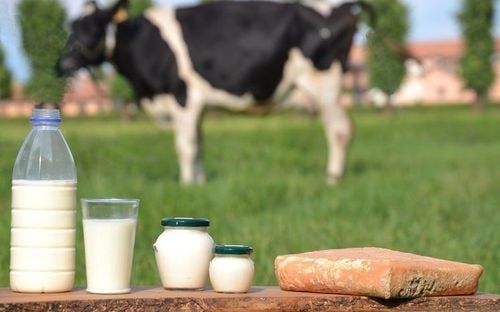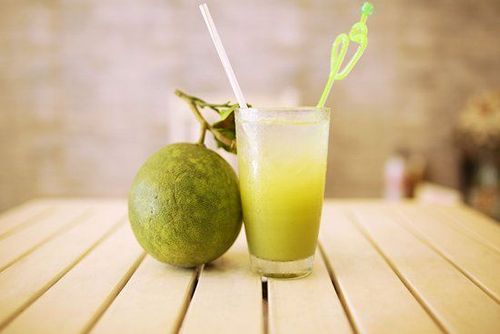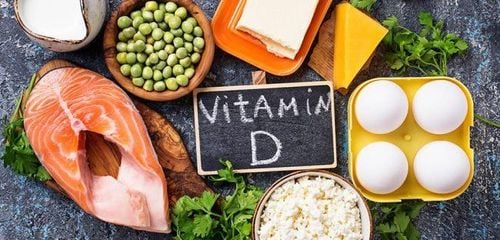This is an automatically translated article.
Nutrition for babies from 0 to 6 months old is to ensure that babies receive enough nutrients during the most important first period of life. The nutrients that your baby needs to get enough of here are calories, protein, fat, vitamins and minerals. Ensuring good nutrition also helps children fight diseases and have good health throughout life, even in old age.
1. Nutrition for children under 1 month old
The needs of every newborn are different. Your baby may need more or less of a certain food group and may also need a more special diet. You need to observe and record your baby's development regularly to make sure he is developing well.
Consult your healthcare provider or dietitian if your child is not gaining weight. They can help you if your baby is having a hard time or isn't getting enough milk each day. Talk to your healthcare provider if your baby has diarrhea or vomiting, or can't/stop drinking breast milk or formula for more than 1 day. This could be a sign that your baby is not able to digest the food you give him and is in need of help.

Trẻ sau 6 tháng tuổi mới cần cho bé ăn dặm
For babies under 6 months of age, breast milk nutrition is the best and most perfect nutrition for the first years of a child's life without the need for any other complementary foods. After 6 months of age, the mother needs to give the baby solid foods. However, depending on the case, some babies still have to supplement with formula or eat solids before 6 months of age. In that case, mothers can refer to the following article to have the most suitable nutrition for children.
Babies under 1 month old need only breast milk . The nutrition for the baby at this time is greatly determined by the nutrition of the nursing mother. Therefore, mothers need to eat enough nutrients, have a reasonable rest to milk more, combined with drinking lots of water to increase milk production. In some cases, the mother cannot exclusively breastfeed her baby, she can add formula milk. However, it is necessary to choose the type of milk that has been tested for food safety and is suitable for children.
2. How to calculate the amount of nutrition for children from 0 to 6 months old

Khi cho trẻ ăn các loại thực phẩm khô cần theo dõi để đảm bảo trẻ không bị sặc
For children under 1 year old need to provide 8 -15% protein, 35 - 55% fat and 30 - 50% carbohydrates. When you try a new food for your baby, try them once a day for 2-3 days, letting your baby get used to the food. When trying new foods such as dry or chewy foods, such as peanut butter, cheese, or dried beans, monitor your child closely to make sure they don't choke.
Calculate amount of food: Use the conversion formula below to measure (grams) the amount of food and liquid (ml).
1-1/2 cups (354 ml) liquid about the size of a can of cocacola 1 cup (237ml) food the size of a large fist 1/2 cup (118ml) is about half a large fist 2 tablespoon the size of a large walnut 1 tablespoon the size of your thumb (from the last fold) 1 teaspoon the size of the tip of your little finger (from the last fold) ) Daily amount of food for babies Breast milk or infant formula: Breast milk or formula is the only food needed for most healthy babies until they are 4-6 months old. Cow's milk or other dairy products should not be given until the baby is one year old, because the baby's kidneys cannot digest the high levels of protein and minerals until that age.

Không nên bổ sung sữa bò cho trẻ khi chưa được một tuổi
0-3 months: 532 ml - 946 ml 4-6 months: 828 ml - 1182 ml 7-9 months: 709 ml - 1064 ml 10-12 months: 532 ml - 887 ml Cereals and starchy foods Other flours: Infant cereal is the only cereal acceptable for babies before six months of age. Other grains such as wheat, barley and oats can be added to babies after 6 months of age. The content of each type of food according to each month of age is calculated as follows:
Grains
0-3 months: no addition 4-6 months: 1/4 - 1/2 cup cereal (mixed) 7-9 months:1/2 - 1 cup, includes mashed potatoes, pasta, rice, bread, crackers, toast, rolls, muffins 10-12 months: 3-4 1/2 cups Fruit
0-3 months: no addition 4-6 months: 1/4 - 1/2 cup, pureed 7-12 months: 1/2-1 cup fresh pureed, canned or soft fruit, such such as bananas

Nước ép không dành cho trẻ từ 0-4 tháng
Juice
0-4 months: no supplements
5-8 months: 1/4 - 1/2 cup
9-12 months: 1/2 cup
Meat, poultry, eggs, fish, cooked dried beans ripe, peanut butter
0-5 months: none 6-8 months: 1-2 tablespoons puree 9-12 months: 1/4 - 1/2 cup (includes regular cheese and cheese, fish , eggs, minced meat) Plain yogurt
0-5 months: none 6-12 months: 1-2 tablespoons /after baby reaches 6 months of age Water
Most babies get the water they need from milk breast milk, formula or juice. In very hot climates, children may need 1/2 to 1 cup per day to compensate.
0-5 months: not necessary except in very hot weather, or if baby has diarrhea 6-12 months: regular daily supplementation
3. Food supplement for children

Cho trẻ ăn thực phẩm có chứa Vitamin D để bổ sung cho trẻ ít tiếp xúc với ánh sáng mặt trời
Consult your Doctor or nutritionist before adding foods from the list below to your baby. The child's needs will depend on the child's diet.
Vitamin D
A supplement may be necessary if your baby is not exposed to regular sunlight.
300 IU daily for 0-6 months 600 IU daily for 6-12 months Fluoride
It may be necessary to supplement your baby with low-fluoridated water. Consult a registered dietitian for fluoride dosage and the name of the product to be purchased.
Vitamin B12
Supplements may be needed for babies of vegan (strict vegetarian) mothers. Consult a nutritionist about the dosage and name of the product to buy
Make a menu for your child: To have a suitable diet, you must consider both your health status and eating habits of your child. You can then discuss the food options with your dietitian. Work with them to decide what foods and necessary care practices will be used to feed, care for or treat your baby.
If you have a need for consultation and examination at the Hospitals of the National Health System, please book an appointment on the website for service.
Please dial HOTLINE for more information or register for an appointment HERE. Download MyVinmec app to make appointments faster and to manage your bookings easily.













